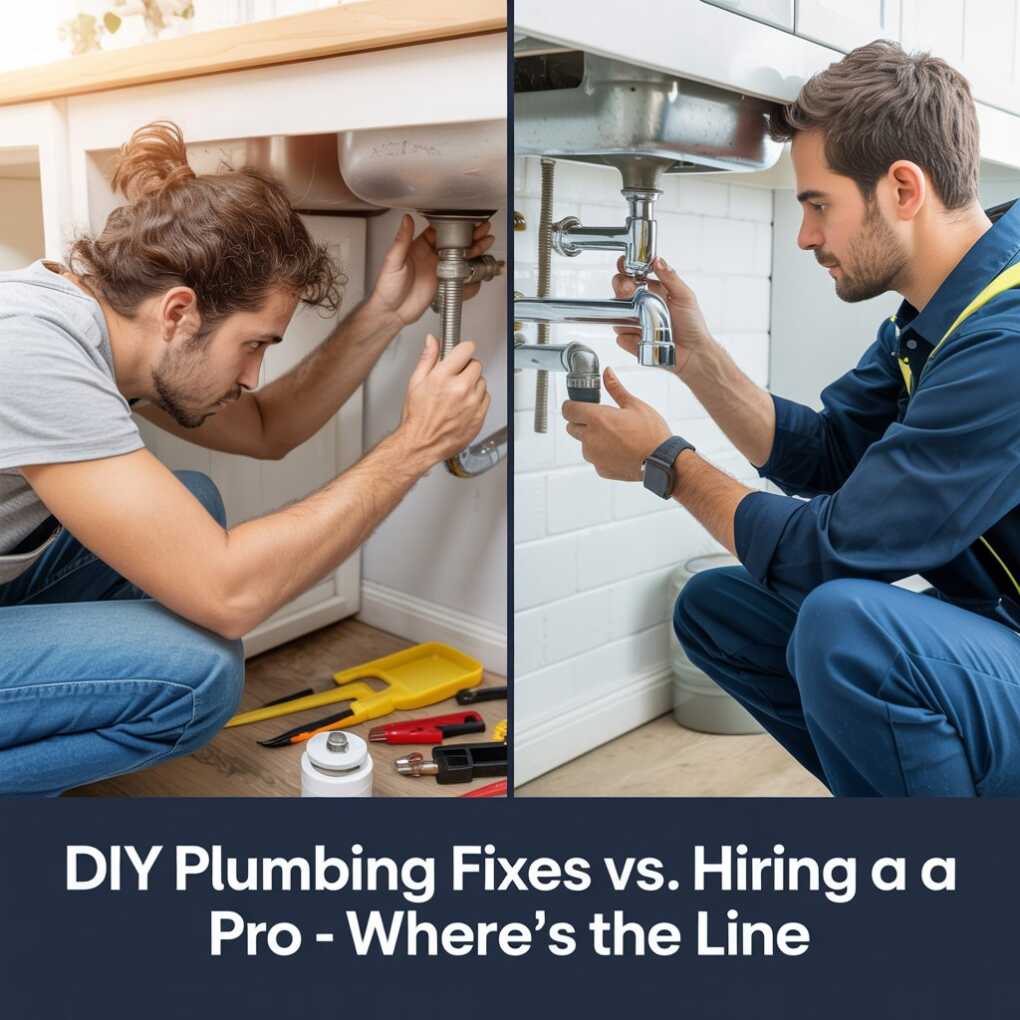When plumbing problems strike, the big question for many homeowners is: should you try DIY plumbing fixes or hire a professional plumber? While YouTube tutorials and toolkits make it tempting to tackle repairs yourself, not every problem is safe—or smart—to handle alone. The key is knowing where the line is between DIY vs professional plumbing, and when to call a plumber before a small issue turns into a disaster.

Easy DIY Plumbing Fixes Most Homeowners Can Do
Some plumbing repairs are simple, affordable, and safe enough for beginners. With basic tools, you can often manage the following:
- Unclogging minor drains
A plunger or hand auger usually clears bathroom and kitchen sink clogs. Avoid pouring chemical drain cleaners, which can damage pipes. - Fixing leaky faucets
Replacing a washer, cartridge, or O-ring usually solves a drip. This is one of the most common and cost-effective DIY plumbing fixes. - Replacing showerheads and aerators
Swapping out old fixtures improves water flow and efficiency. A little Teflon tape goes a long way in preventing leaks. - Running toilet repairs
A new flapper or float adjustment often stops water from constantly running. - Installing simple upgrades
Handheld sprayers, water filters, and even garbage disposals can be installed with basic instructions.
Plumbing repair tip: Always shut off the water supply before working on any fixture to avoid unnecessary flooding.
Plumbing Jobs You Should Leave to the Pros
While some tasks are DIY-friendly, others require professional training and equipment. Attempting them without experience can lead to bigger (and more expensive) problems.
- Sewer line issues – Slow drains throughout the house or foul odors often point to sewer problems. These require specialized inspection tools.
- Water heater repairs and installation – Gas and electric connections make this a safety-sensitive job.
- Pipe replacements – Cutting, soldering, or repiping entire sections of plumbing isn’t a DIY weekend project.
- Hidden leaks – Water stains on walls or ceilings may indicate serious damage that needs expert detection.
- Bathroom or kitchen remodels – Code compliance and correct installations are critical to avoid future headaches.
Knowing when to call a plumber helps protect both your property and your wallet.
DIY vs Professional Plumbing: Pros and Cons
Advantages of DIY Plumbing Fixes
- Saves money on labor costs
- Quick solutions for small problems
- Builds homeowner confidence and skills
Disadvantages of DIY Plumbing Fixes
- Risk of mistakes that make problems worse
- Lack of proper tools or knowledge
- Can void warranties or insurance coverage if done incorrectly
Advantages of Hiring a Professional Plumber
- Correct diagnosis of problems
- Long-lasting solutions and warranties
- Access to professional tools and techniques
- Compliance with building codes and safety standards
Disadvantages of Hiring a Pro
- Higher upfront cost
- Scheduling wait times during busy seasons
How to Decide: DIY or Call a Plumber?
Here’s a simple guideline to help you decide:
- Low-risk issue? → Try a DIY repair first.
- Water damage risk or safety concern? → Call a professional plumber immediately.
- Unsure about the problem? → A plumber’s inspection may save money long-term.
Smart Plumbing Repair Tips for Homeowners
- Keep a basic plumbing toolkit: plunger, pipe wrench, Teflon tape, plumber’s putty, and a hand auger.
- Perform regular maintenance, like flushing your water heater annually to prevent sediment buildup.
- Check under sinks for moisture once a month to catch leaks early.
- Know where your main water shutoff valve is—it can prevent thousands of dollars in damage during emergencies.
Final Thoughts
The choice between DIY plumbing fixes and professional plumbing services doesn’t have to be confusing. Small, non-invasive problems are safe for homeowners to handle, but larger or riskier repairs should always be left to a pro. By understanding when to call a plumber, you’ll avoid costly mistakes and keep your home’s plumbing in top condition.
